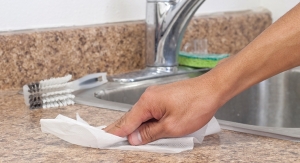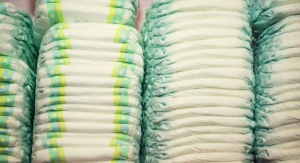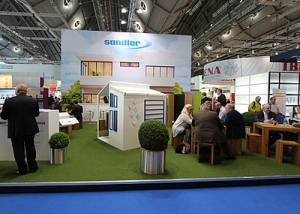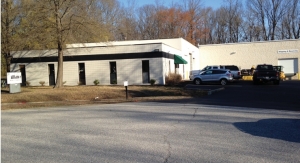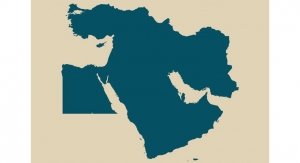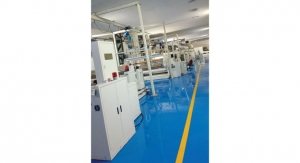09.09.15
Emsdetten, Germany
www.twe-group.com
2015 Nonwovens Sales: $435 million
Key Personnel
Ralf Berens, CCO
Plants
Germany, France, Belgium, Sweden, U.S., China
Processes
Air through bonded, chemical bonded, needlepunch, hydroentengled and airlaid
Major Markets
Hygiene, medical, automotive, filtration, building and construction, cleaning wipes, bedding and furniture, apparel
In June 2015, TWE expanded into the U.S. through the acquisition of Vita Nonwovens, a company once owned by British Vita that has more recently been managed by a group of employees. The purchase included manufacturing sites in Texas, North Carolina and Indiana and has allowed TWE to capitalize on shares competencies within the two companies. This is expected to lead to mutual research and the development of new products. Already, the company has announced it will add two lines, both featuring proprietary technology, to the U.S. operation.
“We want to strengthen our position in the U.S.,” says Ralf Berens, CCO who declined to say exactly where the new lines are located. “Our strategy is playing out—that is we are serving our global accounts with local manufacturing sites.”
The main focus of the Vita Nonwovens operations is the automotives market and products made at the sites are used in a number of different areas of the vehicle. These products are made through a proprietary thermal compacting and bonding process, which has been greatly improved upon during the past three years.
Currently more than 25% of TWE’s sales are conducted within the automotives segment. In addition to Vita, the acquisition of another company, Isowood, a German nonwovens producer specialized in the use of natural fibers for the automotives market, has helped increase TWE’s role in the segment.
“Before Isowood, we did not have a natural product-based material for the automotives market, just for construction,” Berens says. “This material offers an excellent sound absorption benefit at a low weight. This has been favored in many automotive applications.”
TWE now has 14 plants scattered throughout the U.S., Sweden, France, Belgium, Germany and China. Acquisition has been a growth engine that has worked well for TWE and this pattern will likely continue as it looks to expand into other world regions. “There is a choice to establish a greenfield operation or purchase an existing business, but TWE has been quite successful with acquisitions,” Berens says.
He wouldn’t elaborate on what region is next on TWE’s radar but growing in new geographies has been the company’s strategy for a while. Eventually the company would like to have about half of its sales within Europe with the other half split between the U.S. and greater Asia region.
“In general we want to strengthen our international presence,” Berens says. “We are growing more quickly outside of Europe than within it.”
TWE’s hygiene business, its largest market, was boosted in 2012 through the purchase of Libeltex, once a sister company of Vita Nonwovens, from British Vita. A specialist in air-through bonded nonwovens for core applications, Libeltex also provided TWE with manufacturing sites in France, Belgium and Sweden. Before the acquisition, TWE had mainly been present in Germany.
Libeltex’s air through bonded nonwovens, particularly its SlimCore material, have helped diaper manufacturers achieve a new level of thinness in disposable hygiene items and has helped make TWE one of the leading suppliers to the global hygiene market.
While hygiene continues to be the largest market, representing more than one-third of sales, TWE is not resting on its laurels. Its latest product, Amphibia, is described as a product at the cutting edge of technology. This multilayer product combines the ADL and the core for an entirely pulp-free product. This concepts allows for a thinner product and more anatomic fit, allowing the wear to stay dry and comfortable and the manufacturer to reduce costs and improve performance.
Also growing in importance to TWE—in part thanks to the U.S. acquisition—is automotives, which now represent more than 25% of sales. TWE participates in nearly all parts of the vehicle from exteriors to interiors to underbodys to the wheel area.
“Automotives is a real growth engine for us,” Berens says. “It’s becoming more important.”
In addition to global expansion, new product development and innovation are key tenets of TWE’s growth strategy. The development of Home-ISO, a new product for the building and construction market is the result of this focus. The multilayer, thermal bonded polyester insulation product can replace traditional insulation products like fiberglass or mineral wool. The environmentally friendly product costs significantly less than other alternative materials used in areas like pitched roofs, attics and suspended ceilings. “It’s really helping us grow our roofing and construction business,” Berens says.
www.twe-group.com
2015 Nonwovens Sales: $435 million
Key Personnel
Ralf Berens, CCO
Plants
Germany, France, Belgium, Sweden, U.S., China
Processes
Air through bonded, chemical bonded, needlepunch, hydroentengled and airlaid
Major Markets
Hygiene, medical, automotive, filtration, building and construction, cleaning wipes, bedding and furniture, apparel
In June 2015, TWE expanded into the U.S. through the acquisition of Vita Nonwovens, a company once owned by British Vita that has more recently been managed by a group of employees. The purchase included manufacturing sites in Texas, North Carolina and Indiana and has allowed TWE to capitalize on shares competencies within the two companies. This is expected to lead to mutual research and the development of new products. Already, the company has announced it will add two lines, both featuring proprietary technology, to the U.S. operation.
“We want to strengthen our position in the U.S.,” says Ralf Berens, CCO who declined to say exactly where the new lines are located. “Our strategy is playing out—that is we are serving our global accounts with local manufacturing sites.”
The main focus of the Vita Nonwovens operations is the automotives market and products made at the sites are used in a number of different areas of the vehicle. These products are made through a proprietary thermal compacting and bonding process, which has been greatly improved upon during the past three years.
Currently more than 25% of TWE’s sales are conducted within the automotives segment. In addition to Vita, the acquisition of another company, Isowood, a German nonwovens producer specialized in the use of natural fibers for the automotives market, has helped increase TWE’s role in the segment.
“Before Isowood, we did not have a natural product-based material for the automotives market, just for construction,” Berens says. “This material offers an excellent sound absorption benefit at a low weight. This has been favored in many automotive applications.”
TWE now has 14 plants scattered throughout the U.S., Sweden, France, Belgium, Germany and China. Acquisition has been a growth engine that has worked well for TWE and this pattern will likely continue as it looks to expand into other world regions. “There is a choice to establish a greenfield operation or purchase an existing business, but TWE has been quite successful with acquisitions,” Berens says.
He wouldn’t elaborate on what region is next on TWE’s radar but growing in new geographies has been the company’s strategy for a while. Eventually the company would like to have about half of its sales within Europe with the other half split between the U.S. and greater Asia region.
“In general we want to strengthen our international presence,” Berens says. “We are growing more quickly outside of Europe than within it.”
TWE’s hygiene business, its largest market, was boosted in 2012 through the purchase of Libeltex, once a sister company of Vita Nonwovens, from British Vita. A specialist in air-through bonded nonwovens for core applications, Libeltex also provided TWE with manufacturing sites in France, Belgium and Sweden. Before the acquisition, TWE had mainly been present in Germany.
Libeltex’s air through bonded nonwovens, particularly its SlimCore material, have helped diaper manufacturers achieve a new level of thinness in disposable hygiene items and has helped make TWE one of the leading suppliers to the global hygiene market.
While hygiene continues to be the largest market, representing more than one-third of sales, TWE is not resting on its laurels. Its latest product, Amphibia, is described as a product at the cutting edge of technology. This multilayer product combines the ADL and the core for an entirely pulp-free product. This concepts allows for a thinner product and more anatomic fit, allowing the wear to stay dry and comfortable and the manufacturer to reduce costs and improve performance.
Also growing in importance to TWE—in part thanks to the U.S. acquisition—is automotives, which now represent more than 25% of sales. TWE participates in nearly all parts of the vehicle from exteriors to interiors to underbodys to the wheel area.
“Automotives is a real growth engine for us,” Berens says. “It’s becoming more important.”
In addition to global expansion, new product development and innovation are key tenets of TWE’s growth strategy. The development of Home-ISO, a new product for the building and construction market is the result of this focus. The multilayer, thermal bonded polyester insulation product can replace traditional insulation products like fiberglass or mineral wool. The environmentally friendly product costs significantly less than other alternative materials used in areas like pitched roofs, attics and suspended ceilings. “It’s really helping us grow our roofing and construction business,” Berens says.



